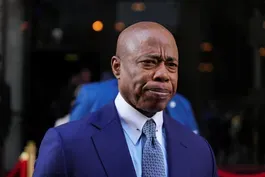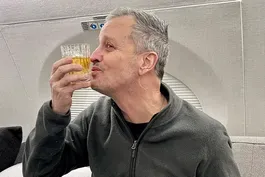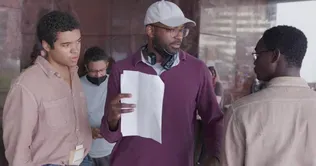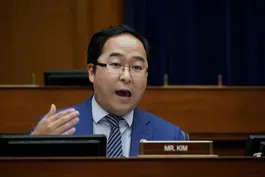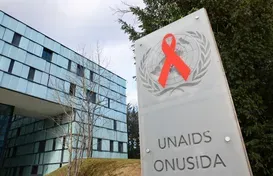
Students keep learning after wildfires destroy schools
Clip: 2/11/2025 | 7m 3sVideo has Closed Captions
Students and teachers find ways to keep learning after wildfires destroy schools
Amid the devastation of the wildfires that tore through Southern California last month, thousands had their education disrupted. At least a dozen schools were burned or so badly damaged that students can’t return any time soon. William Brangham spent time with teachers and students from an elementary in Altadena to understand how educators keep moving forward in the middle of a disaster zone.
Major corporate funding for the PBS News Hour is provided by BDO, BNSF, Consumer Cellular, American Cruise Lines, and Raymond James. Funding for the PBS NewsHour Weekend is provided by...

Students keep learning after wildfires destroy schools
Clip: 2/11/2025 | 7m 3sVideo has Closed Captions
Amid the devastation of the wildfires that tore through Southern California last month, thousands had their education disrupted. At least a dozen schools were burned or so badly damaged that students can’t return any time soon. William Brangham spent time with teachers and students from an elementary in Altadena to understand how educators keep moving forward in the middle of a disaster zone.
How to Watch PBS News Hour
PBS News Hour is available to stream on pbs.org and the free PBS App, available on iPhone, Apple TV, Android TV, Android smartphones, Amazon Fire TV, Amazon Fire Tablet, Roku, Samsung Smart TV, and Vizio.
Providing Support for PBS.org
Learn Moreabout PBS online sponsorshipAMNA NAWAZ: Let's return now to our ongoing coverage of the wildfires that tore through Southern California last month.
Amid all the devastation, thousands of children also had their education disrupted.
At least a dozen schools were burned or so badly damaged that kids can't return any time soon.
William Brangham recently spent time with teachers and students from one elementary school in Altadena, California, to better understand how educators keep moving forward in the middle of a disaster zone.
MAN: We don't want to miss the bus, do we?
WILLIAM BRANGHAM: Parents rush to get kids on the bus.
Students are greeted as they head into class.
It has the look and feel of a normal school day for Rosebud Elementary in Altadena, California.
But it's not, because this is Rosebud today.
What was once a small charter school is now an unrecognizable pile of twisted metal, ash and rubble.
It's one of the more than 9,000 buildings that were consumed by the massive Eaton Fire a month ago.
Melted desks, a charred water fountain, warped playground equipment, they're just a few hints of what this place used to be.
SHAWN BROWN, Executive Director, Pasadena Rosebud Academy: Our school burned down on January 7 in the middle of the night.
And my house is literally one mile from the school and it also burned.
Good morning.
WILLIAM BRANGHAM: Shawn Brown runs Rosebud Elementary.
SHAWN BROWN: So we had about 35 students who lost their home, whose homes burned completely down.
WILLIAM BRANGHAM: Thirty-five out of how many?
SHAWN BROWN: Out of 175.
WILLIAM BRANGHAM: Wow, so a big percentage of kids.
SHAWN BROWN: That was a big percentage of kids.
And then we had another roughly 29 students who were displaced and were just scrambling to find somewhere to go.
WILLIAM BRANGHAM: So how do you instill a sense of security and safety for kids who had both stolen from them by these fires?
Brown says they have begun offering mental health services for kids, but simply having them return to class was a big step.
SHAWN BROWN: The goal was to make sure that they get back together in person and see each other.
And, sure, we lost our building, but we still have each other.
And I think that has been a huge factor in students being able to move forward.
STUDENT: Then we went outside.
We checked and we saw the fire getting bigger.
My mom said we should leave.
WILLIAM BRANGHAM: With nowhere to gather, a few weeks ago, they started busing students nearly an hour away to a donated event space in South L.A. Its owners, a local education foundation called SoLa, helped convert the space into several classrooms.
XACHARY JEFFERSON, Student: We're here in this building because my school burned down in the fire.
WILLIAM BRANGHAM: Nine-year-old Xachary Jefferson's home and school went up in flames in a matter of hours.
Do you remember when you found out about your school burning down?
Like, how did you hear that news?
XACHARY JEFFERSON: I just came down the stairs one day and my mom was like crying.
And I was like, why are you crying?
And it was like: "Our house burned down and our school burned down."
My school burned down.
And so I was crying too.
I felt sad.
WILLIAM BRANGHAM: Rosebud parent Lorin Young also lost her home.
LORIN YOUNG, Mother: Our house is done.
WILLIAM BRANGHAM: She filmed this the day after her family was forced to evacuate.
LORIN YOUNG: That's our house.
WILLIAM BRANGHAM: Young's 5-year-old son, London (ph), is a kindergartner at Rosebud.
She wants 4-year-old Rain (ph) to go as well when he's old enough.
LORIN YOUNG: I really feel like London was thriving there.
He is to himself a lot.
So to see him flourish at school and have so many friends of all ages, not just his class, it felt like more than a school for us.
It's a second home almost.
WILLIAM BRANGHAM: Since the fire, Young and the boys have been living like so many evacuees, staying in four different hotels in as many weeks.
Throughout, she's tried to protect them from the full scale of what's been lost.
LORIN YOUNG: London has asked to see our house.
He's asked to see the school.
And that's something I don't think I will let him do.
WILLIAM BRANGHAM: You just think that's going to be too jarring for him?
LORIN YOUNG: Yes, yes.
For now, I think just him knowing what happened and us kind of shielding him from the actual images of it, I think is best.
WILLIAM BRANGHAM: But when students are willing to share, handling those conversations often falls to teachers like Laura Chavez.
LAURA CHAVEZ, Teacher: I love the color scheme.
WILLIAM BRANGHAM: Chavez grew up in Altadena.
She teaches fourth grade and, like so many of her students, lost her home in the fire as well.
LAURA CHAVEZ: The town that I grew up in, you can't even -- I'm going to get emotional.
You can't -- it's not there.
It was something out of a movie.
It was so -- it was apocalyptic.
WILLIAM BRANGHAM: How do you talk to the kids about the fires?
Do you talk to them about it?
LAURA CHAVEZ: Yes, yes.
I wanted to make sure that they knew that I was just like them.
Like, it happened to me too.
And it's OK to share.
And I just let them tell me all about how they lost their dinosaurs or their favorite shoes and all of their things and their toys.
WILLIAM BRANGHAM: Shawn Brown says, this week, the school relocated again to another temporary location.
When you're faced with a disaster like this, there's -- it doesn't sound like there's some kind of a textbook that you pull off the shelf to say, oh, here's what you do on day one, on day five, on day 10.
Like, how did you figure all this out?
SHAWN BROWN: I just had to figure it out because I knew that the kids needed us, their families needed us to help them navigate this situation.
And so that was just kind of like my main focus.
What are we going to do with these kids?
We have got to get them back in school.
We have got to make sure that they are OK. WILLIAM BRANGHAM: When his family fled, Xachary Jefferson grabbed a basketball and his best sneakers.
Despite everything he and his family have lost, the fires have also given him some perspective.
XACHARY JEFFERSON: In the bus drives, sometimes, I see homeless people and I think, how are they living?
Because they don't -- they never had a home.
So, I still feel sad every once in a while and think about the stuff I have lost, but I still try to get through it and learn.
WILLIAM BRANGHAM: Getting through it and learning, it's a mission that Rosebud and many other schools in the region are now trying to accomplish.
For the "PBS News Hour," I'm William Brangham in Altadena, California.
Corruption charges against New York Mayor Eric Adams dropped
Video has Closed Captions
Justice Department drops corruption charges against New York Mayor Eric Adams (5m 20s)
The long-term impact of Trump's cuts to medical research
Video has Closed Captions
The possible long-term impact of Trump's cuts to medical research funding (9m 31s)
News Wrap: American Marc Fogel released from Russia
Video has Closed Captions
News Wrap: American Marc Fogel released from Russian detention (7m)
'Nickel Boys' director RaMell Ross on his distinct style
Video has Closed Captions
'Nickel Boys' director RaMell Ross on his distinct style and earning an Oscar nomination (6m 46s)
Sen. Kim on why he says U.S. nearing constitutional crisis
Video has Closed Captions
Democratic Sen. Andy Kim explains why he thinks U.S. is nearing a constitutional crisis (6m 46s)
Trump repeats Gaza idea as Israel threatens to end ceasefire
Video has Closed Captions
Trump doubles down on Gaza takeover idea as Israel threatens to restart war with Hamas (4m 7s)
UNAIDS says infections could soar if U.S. drops support
Video has Closed Captions
UN AIDS agency says HIV infections could soar worldwide if U.S. drops support (5m 54s)
Providing Support for PBS.org
Learn Moreabout PBS online sponsorshipMajor corporate funding for the PBS News Hour is provided by BDO, BNSF, Consumer Cellular, American Cruise Lines, and Raymond James. Funding for the PBS NewsHour Weekend is provided by...

